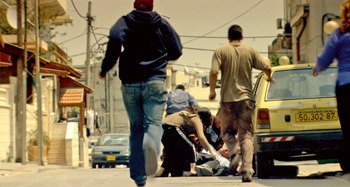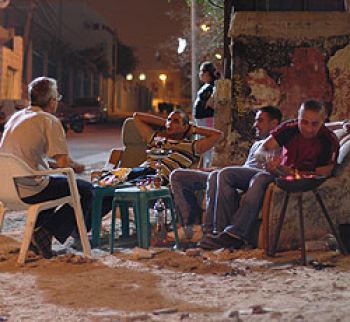Many days have passed since I saw Ajami [1], the prize-bedecked film of Scandar Copti and Yaron Shani. Its darkness has not left me. Death, the death in the final scene, still stares me down, still threatens. I can still hear the words of the boy at the end, calling on us to open our eyes.
Ajami is fiction, but it seems at times like a documentary. With great sensitivity it conveys the pulse of the violence-blighted Jaffa neighborhood of this name, the anger, the pain and the local humor. All but two of the actors are people of the neighborhood, who trained for two years with the directors. Some have experienced in their flesh the kinds of incidents the film portrays. The playing of some seems as if born from within them. Special plaudits go to the acting of Shahir Kabaha (Omar, the main character), Youssef Sahwani (Abu Alias) and the young Fouad Habash (Nasri).
I was born and raised in Ajami, on the street where Omar lives, and seeing the film was for me a journey through memory. The scene near the start, where a youth is murdered because of mistaken identity, is an almost exact rendering—down to the actual spot on the street—of the murder of 16-year-old Ahmad Ghuti, an event that forever marked our lives in the neighborhood.
When I recall my thirty years there, the picture that comes to mind, with minor variations between incidents, is this: sounds of gunfire, the heart beats wildly, fear freezes every thought except one—where is your brother? Every boy in the neighborhood lives under threat. Doors open, men pour into the streets, and I, with the rest of the women, cling wide-eyed to the window bars. Minutes pass. Then comes the screech of a car carrying the dead or wounded. Another few minutes and suddenly the screech of a mother cuts the night. On such a night—and there were many—Ajami did not sleep. On the next day the house of mourning is opened to visitors, and everyone knows that another will open soon after, when the family of the victim has taken revenge.
Ajami the film is divided into five linked segments, each focusing on an event from the neighborhood’s past: the mistaken murder in the context of a blood feud; grotesque negotiations seeking to quell bloodlust by appeal to moneylust; forbidden love between Muslim and Christian; Palestinian workers from the Territories, who sneak in looking for jobs, and their relation to the Israeli Arabs employing them; the tense relations between Ajami’s Arabs and Jews. The last is treated in a scene that likewise ends in murder, reminiscent of artist Gil Mitchell’s death a decade ago at the hands of a young Arab now doing twenty years.
An internal Arab debate
Many Arabs who saw the film, especially Jaffans, were disappointed. They’d hoped to see their city as it once was: the cultural center of Palestine. Instead they were made to look in the mirror, and the reflection was hardly flattering. I overheard complaints about "hanging out the dirty laundry in public." Yet no amount of denial will hide the fact that Jaffa is hard hit by unemployment and poverty, that it suffocates under a chronic housing shortage, and that crime is everywhere—in these respects like many of the world’s cities.
Arab intellectuals also have reservations: the film does not attack the Israeli policies that led to this situation. For it is no secret that most Palestinian films, indeed most Arab films, tend to blame racist policy for the ills of Arabs in Israel, as they blame the Occupation for the ills of the Territories, while avoiding self-criticism. For me the film’s effectiveness in showing Arab Jaffa’s deterioration, contrasted with wealthy Jewish Tel Aviv next door, is criticism aplenty.
In my view, Ajami levels a severe indictment against Israel’s successive governments. It is not by chance that the work is a collaborative effort between the Jaffan Copti and the Tel Avivian Shani. Jaffa’s condition is Shani’s problem as well as Copti’s. Yet the film does not excuse us Arabs from responsibility for our situation. I see Ajami, therefore, as an exceptional artistic and social contribution to the soul-searching that we must undertake in order to build our society anew.
One last word
Ajami presents our neighborhood as one that devours its inhabitants, one where there is no place for love or hope. Nasri (Omar’s younger brother), who might have represented hope for a better future, is swept into the circle of bloodshed.
And yet I want to see a ray of light in the fact that the film was made. Scandar and Shani deserve gratitude for this work of art, as do all the young people who studied acting with them in preparation for the project. These are people who overcame anger and pain to make this film. They constitute the proof of positive forces in Ajami. Thanks are due them for setting up the mirror, in hope that the present reality will one day be a mere tale of the past, and that Ajami will manage to gather its forces and pull itself out of the swamp, becoming the beauty—yaffa—among neighborhoods, as it once was, many years ago.
Ajami (2009): Directed by Scandar Copti, Yaron Shani
Cast: Fouad Habash, Nisrine Rihan, Elias Saba, Youssef Sahwani, Abu George Shibli, Ibrahim Frege, Scandar Copti, Shahir Kabaha, Hilal Kabob, Ranin Karim, Eran Naim, Sigal Harel, Tamar Yerushalmi, Moshe Yerushalmi



